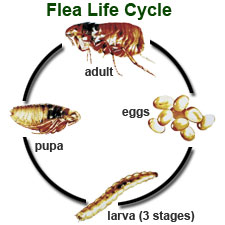Adult fleas are easy to kill, it is their life stages that cause so much grief. Fleas carry diseases to both animals and people. Under extreme conditions they can cause death, loss of hair, skin infections, and misery for man and beast.
In today’s modern world there are multiple products available that if properly used are very effective for killing and preventing fleas. The key phrase is “if used properly”, compliance is necessary for flea prevention and elimination. Medications used improperly can kill pets.
Fleas are very dependent upon weather and environmental conditions. For example, Arizona has no flea problem as the humidity is too low. In NJ heat and humidity changes with the seasons and also in our homes. These changes greatly effect flea populations.
Fleas need heat and humidity in order to survive, be active and to breed. Once a flea gets on an animal it does not willingly leave. All stages of fleas, including eggs, larva (maggot) and pupa die when it gets cold (below 30 degrees). During cold weather there are no fleas, eggs, or pupa that survive outside unless they are on an animal (pet, raccoon, rabbit, coyote, etc.).
Another misconception is that in the fall the fleas live outdoors and hop into the house. Cat fleas are really house fleas and in the Northeast they winter over in the house and then become a huge problem as the summer progresses.
The breeding cycle from egg to egg laying female generally takes 3 to 4 months but when conditions are right, above 90 degrees with high relative humidity 80-95%, the cycle may be as short as 11 days. A mature female flea lays approximately 2,000 eggs and for each egg laid, she discharges a drop of bloody stool which then serves as food for the flea larve. Only female fleas readily bite their host and gorge on blood.
In our area the end of November and first two weeks of December are very active times for fleas. The reason being is that houses are warm due to furnace heat and the humidity is still high. Part of the life cycle of the flea is a pupa. A miniature flea can remain one year in this stage and hatch when conditions are right and when they hear four feet. Once a flea emerges (like a butterfly) they need to get onto an animal quickly or they will die of dehydration and starvation when the relative humidity decreases in the house (dry – need humidifier). Fleas become very inactive and do not hatch out of their cocoons(pupa) during times of low heat and low humidity.
Another misconception is that fleas can be controlled with baths, bombing the house, dips or products designed only to kill. Many of the veterinary flea products kill fleas, prevent heart worm,and treat internal parasites for 1 month. The overriding principal of flea control is “dead fleas don’t lay eggs.” The most successful strategy is to use a monthly product every month with no exceptions. Fleas are easy to kill, but it takes a dedicated and consistent program to keep them off of the pets and out of the house. Again, it is their life stages that cause outbreaks when there doesn’t appear to be a previous problem.

